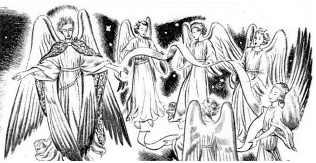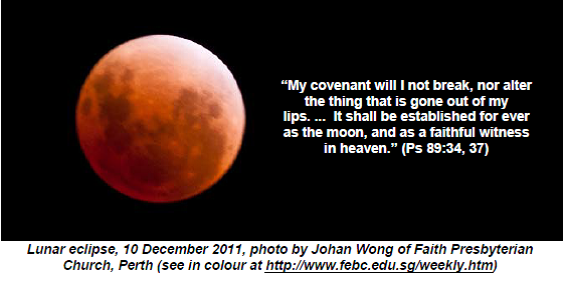Christmas 2000 Years Ago (I)

The Lord Jesus Christ was born 2000 years ago. Who visited the baby Jesus that night when He was born?
Appearance of the Angels (Luke 2:8-14)
Based on Luke’s account in chapter 2:8-20, the visitors that night when Christ was born were only the shepherds. The birth of Christ was announced to them by the angel of the Lord who appeared to them while they were watching over their sheep. The angel brought a wonderful piece of news from heaven: “Fear not: for, behold, I bring you good tidings of great joy, which shall be to all people. For unto you is born this day in the city of David a Saviour, which is Christ the Lord” (Luke 2:10-11). Then appeared a great company of angels praising God, and saying, “Glory to God in the highest and on earth peace, good will toward men” (Luke 2:14).
What is this “peace” and “good will”? The peace that came with the birth of Christ is certainly not a general, outward peace among men. Jesus Himself said, “Think not that I am come to send peace on earth: I came not to send peace, but a sword” (Matt 10:34). When Christ was born, Herod went on a rampage and massacred all babies two years and below (Matt 2:16). There was no peace. This peace that the angels proclaimed has to be the special, inward peace that comes when man is reconciled to God in Christ. Paul spoke of this in Romans 5:1, “Therefore being justified by faith we have peace with God through our Lord Jesus Christ: … being now justified by his blood, we shall be saved from wrath through him. For if, when we were enemies, we were reconciled to God by the death of his Son, much more, being reconciled, we shall be saved by his life” (Rom 5:1, 9, 10). Christ our Mediator has saved us not only by His death but also by His life. Christ earned the righteousness of God for us when He lived a perfect life on earth in fulfilment of the Law (Matt 5:17-18). The peace of God that comes from Christ is the result of Christ imputing His righteousness on us when we accept Him as our Lord and Saviour.
The “good will” that the angels referred to is not man’s but God’s good will. The KJV rightly translates it as “good will toward men.” This good will that is towards men originates from God. God is the source of peace. God’s peace is a free gift. It is by the grace of God alone that sinful men are bestowed the peace that comes from above. Since salvation is purely by God’s grace, only God can boast when sinners are saved, and that is why to God and God alone the glory belongs. “For when we were yet without strength, in due time Christ died for the ungodly. For scarcely for a righteous man will one die: yet peradventure for a good man some would even dare to die. But God commendeth his love toward us, in that, while we were yet sinners, Christ died for us” (Rom 5:6-8).
Worship by the Shepherds
(Luke 2:15-20)
The birth of Christ was not witnessed by the high and mighty, but the lowly and humble. The angels brought the wonderful news of the birth of Jesus not to kings, but to shepherds. The Lord Himself was born not in a palace, but in a stable, and laid in a manger. Why such an ignominious entrance and visitation? God intended right from the start to have all know that His good will and peace are received only by those who humble themselves before Him who has humbled Himself for them. It is from the Lord’s self-effacing example that Paul drew inspiration to exhort the Philippians to be humble: “Let this mind be in you, which was also in Christ Jesus: Who, being in the form of God, thought it not robbery to be equal with God: But made himself of no reputation, and took upon him the form of a servant, and was made in the likeness of men: And being found in fashion as a man, he humbled himself, and became obedient unto death, even the death of the cross” (Phil 2:5-8).
Circumcision of Jesus (Luke 2:21)
The ceremony of circumcision as a sign of God’s covenant with Abraham is recorded in Genesis 17:10. All male infants in Israel are to be circumcised on the eighth day (Lev 12:3). Why must Jesus be circumcised? He was circumcised not just because He was Jewish, but more importantly because He was to keep the Law in every aspect for our salvation. Calvin supplied this theological insight:
God appointed that his Son should be
circumcised, in order to subject him to
the law; for circumcision was a solemn
rite, by which the Jews were initiated
into the observance of the law. Paul
explains the design, when he says, that
Christ was ‘made under the law,
to redeem them that were under the
law’ (Galatians 4:4, 5). By undergoing
circumcision, Christ acknowledged
himself to be the slave of the law, that
he might procure our freedom.
The name “JESUS” means “Saviour.” True to that name, the Lord Jesus even as an infant worked for our salvation right from the start. Christ’s circumcision is not the first and only instance of His obedience to the Law. Throughout His ministry on earth, the Lord was very careful to keep the Law perfectly without any flaw.
Purification of Mary and Dedication of Jesus
(Luke 2:22-24)
The Lord’s keeping of the Law can also be seen in His participation of the following rituals though as an infant: (1) Mary’s rite of purification (Lev 12:1-8), and (2) the dedication of the first-born (Num 3:13). It is important to understand that these ceremonies involve not just the individual, but also the family by virtue of the Law’s covenantal nature (Deut 6:1-3).
On the 40th day after the baby was born (ie, 41st day), Mary had to present herself to the temple for purification. Joseph and Mary were also to present Jesus for dedication. Although Mary alone was to go through the purification, Jesus was indirectly a participant of that ritual because Mary’s purification was required on account of His birth. This must not be taken to mean that Jesus had to be cleansed from sin as well. Jesus had no sin. He went through the purification in identification with sinners since He was going to be their Representative as their Guilt-Bearer. Calvin said,
... it ought not to appear strange that
Christ who was to be made a curse for us
on the cross (Galatians 3:13) should for
our benefit take upon him our
uncleanness with respect to legal guilt
though he was ‘without blemish and
without spot’ (1 Peter 1:19). It ought not, I
say, to appear strange if the fountain of
purity, in order to wash away our stains,
chose to be reckoned unclean.
Thanksgiving of Simeon and Anna
(Luke 2:25-38)
At least two in Israel (viz, Simeon and Anna) were eagerly awaiting the coming of Israel’s Messiah in light of the Old Testament prophecies. In honour of their faith, the Lord granted them the privilege of seeing their Messiah before they died.
God had promised Simeon that before he died he would see Christ. The Greek “Christ” is equivalent to the Hebrew “Messiah,” meaning “the Anointed One.” When he laid eyes on Jesus, he rightly said that he was beholding the Lord’s salvation. Jesus Christ was to be the Saviour of all people—both Jew and Gentile. He also spoke of the agony Jesus had to suffer on the cross, and how Mary herself would grieve because of it.
At this juncture, it is important to expose an attack on Christ by modern versions of the Bible like the NIV that make Joseph the father of Jesus. In the KJV, Luke 2:33 reads, “And Joseph and his mother marvelled at those things which were spoken of him.” But in the NIV, we read, “The child’s father and mother marvelled at what was said about him.” Do you see the problem here? By making Joseph the “father” of Jesus, the NIV has corrupted God’s Word and compromised Christ’s deity. It has corrupted God’s Word by adding to God’s Word. They inserted the word “father” which was not in the inspired text in the first place (cf Rev 22:18). And in so doing, the NIV has undermined Christ’s deity by making Joseph the father of Jesus. This contradicts the virgin birth of Christ. Joseph was not the father of Jesus and was never called Jesus’ “father” in the divinely inspired and preserved Scriptures.
The KJV, on the other hand, has translated the inspired and preserved Greek text accurately; it is “Joseph and his mother.” Jesus has only one Father, and that is the first Person of the Holy Trinity. Jesus only addressed one Person as Father in the Scriptures, and that is His Father in heaven. That Jesus never regarded Joseph His father and never addressed him as such can be seen in His correction of Mary when she said, “thy father and I have sought thee” (Luke 2:48) which was met with this answer, “How is it that ye sought me? wist ye not that I must be about my Father’s business?” (v49). Jesus could have used the word “God,” or “Lord,” but He did not. He purposely used the word “Father” to point to Mary that Joseph was in no way His father. In her moment of anxiety, Mary called Joseph Jesus’ “father”. Perhaps she thought that would make her sound more authoritative. So Jesus had to gently correct her. Joseph was not His father; God alone was His Father. And Jesus would call no one “Father” but His Father in heaven. The inspired account carefully distinguished between Joseph’s actual relationship to Jesus by the words “Joseph and his mother,” not only in verse 33 but also 43, again purposely avoiding the title “father” for Joseph.
Anna, the prophetess, understood the Old Testament Scripture well when she said that Jesus was Jerusalem’s redemption. Jerusalem as the capital of Israel represents the nation as a whole. Anna’s “redemption of Jerusalem” is similar to Simeon’s “consolation of Israel” (Luke 2:25). Israel’s hope and glory rest on her Messiah—the Lord Jesus Christ, the Son of David (Isa 52:9 cf 2 Sam 7:12-13). Born in the city of David (Luke 2:11), He will one day rule over the whole world from a restored Jerusalem. This He will do when He comes again. May He come back soon! JK



